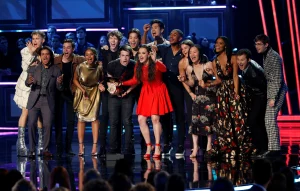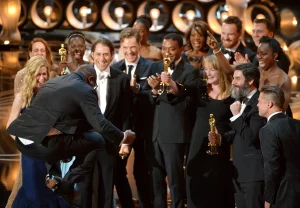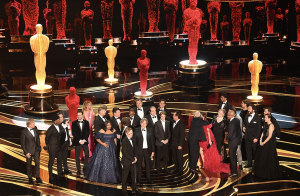
Introduction
Award shows have long been a cornerstone of the entertainment industry, celebrating achievements across various fields such as film, music, television, and more. However, as technology has advanced and digital platforms have become ubiquitous, the landscape of these prestigious events has undergone significant transformations. This article delves into the evolution of award shows in the digital age, exploring how they have adapted to new media, changing audience preferences, and the ever-evolving technological landscape.
Historical Context: The Golden Age of Award Shows

1.Traditional Formats
In their early years, award shows were grand, meticulously orchestrated events typically broadcast on television. These ceremonies were characterized by their glitz and glamour, with celebrities donning extravagant outfits and walking the red carpet. The Oscars, Grammys, and Emmys were among the most prominent, drawing millions of viewers each year.
2.Audience Engagement
Audience engagement during this period was relatively passive. Viewers would tune in to watch the live broadcast, and their interaction was limited to discussing the event with friends or family. The primary mode of feedback was through Nielsen ratings, which measured the number of viewers but offered little insight into their preferences or sentiments.
The Digital Disruption

1.The Rise of Social Media
The advent of social media platforms such as Twitter, Facebook, and Instagram marked a significant turning point in the evolution of award shows. These platforms provided a new avenue for real-time interaction, allowing viewers to share their thoughts, reactions, and predictions as the event unfolded. Hashtags related to the award shows began trending, creating virtual communities of engaged fans.
2.Live Streaming and On-Demand Viewing
With the proliferation of high-speed internet and the rise of streaming services, the way audiences consumed content began to change. Award shows started to offer live streaming options, making it possible for viewers to watch the event on their smartphones, tablets, or computers. Additionally, on-demand viewing allowed audiences to catch up on highlights or rewatch their favorite moments at their convenience.
3.Interactive Features
Digital platforms also introduced interactive features that enhanced the viewing experience. Polls, quizzes, and live chats enabled viewers to participate actively, voting for their favorite nominees or predicting winners. Some award shows even incorporated augmented reality (AR) and virtual reality (VR) elements, providing an immersive experience for the audience.
The Impact of Data Analytics

1.Understanding Audience Preferences
The digital age has brought about a data revolution, enabling award show organizers to gather detailed insights into audience behavior and preferences. Social media analytics, for instance, can reveal which moments garnered the most attention, which celebrities were the most talked about, and what aspects of the show resonated with viewers.
2.Personalized Content
Leveraging data analytics, organizers can create personalized content tailored to different audience segments. For example, behind-the-scenes footage, exclusive interviews, and interactive content can be curated based on the interests of specific demographic groups. This not only enhances audience engagement but also fosters a deeper connection with the event.
The Role of Influencers and Digital Creators
1.Expanding the Reach
In the digital age, influencers and digital creators have become integral to the promotion and coverage of award shows. With their large followings and engaged fan bases, these individuals can amplify the reach of the event, attracting younger and more diverse audiences. Collaborations with influencers often involve exclusive content, live reactions, and behind-the-scenes access, creating a buzz around the event.
2.Authenticity and Relatability
Unlike traditional celebrities, influencers are often seen as more relatable and authentic by their followers. Their involvement in award shows adds a layer of authenticity and helps bridge the gap between the event and the audience. This shift has prompted organizers to rethink their marketing strategies, focusing on authentic storytelling and genuine engagement.
The Future of Award Shows

1.Virtual and Hybrid Events
The COVID-19 pandemic accelerated the adoption of virtual and hybrid event formats. Award shows had to adapt quickly, incorporating virtual elements to ensure the safety of participants and audiences. While in-person events have gradually returned, the success of virtual components has paved the way for hybrid formats, combining physical and digital experiences.
2.Sustainability and Inclusivity
The digital age has also brought increased awareness of social and environmental issues. Award shows are now expected to demonstrate their commitment to sustainability and inclusivity. This includes adopting eco-friendly practices, promoting diversity and representation, and using their platform to address important social causes.
Future Innovations
1.Enhanced Viewer Engagement
The future of award shows will likely see further enhancements in viewer engagement. Innovations such as interactive voting, personalized content recommendations, and gamification elements can create more engaging and dynamic experiences. Leveraging data analytics and artificial intelligence can help tailor content to individual preferences, increasing viewer satisfaction.
2.Expanded Digital Integration
Award shows will continue to expand their digital integration, utilizing emerging technologies and platforms. The rise of 5G technology, for example, can enable seamless streaming and real-time interaction on mobile devices. Collaborations with streaming giants and social media platforms will further enhance accessibility and reach.
Conclusion
The evolution of award shows in the digital age is a testament to the dynamic nature of the entertainment industry. From traditional televised events to interactive, data-driven experiences, award shows have continuously adapted to meet the changing preferences of audiences. As technology continues to evolve, it will be fascinating to see how these prestigious events further innovate, ensuring they remain relevant and engaging in the ever-changing digital landscape.









